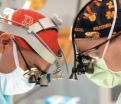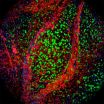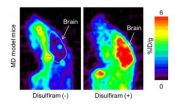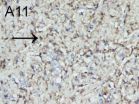(Press-News.org) Seattle, WA—A new team approach has improved safety—reducing rates of major complications by two thirds—for complex spinal reconstructive surgery for spinal deformity in adult Group Health patients at Virginia Mason Hospital & Seattle Medical Center. An article in the March issue of Spine Deformity gives a detailed description of the standardized protocol before, during, and after the surgery, stressing the new approach's three main features:
Two spine surgeons in the operating room
A live preoperative screening conference
Monitoring bleeding during the operation
The research team reviewed 164 consecutive patients: 40 before and 124 after the new three-pronged approach was implemented. After implementation, patients were three times less likely to develop major complications. Improvements included significant reductions in rates of wound infection, deep vein thrombosis, pulmonary embolism, and urinary tract infections. Patients were also significantly less likely to have to return to the operating room within 90 days after the surgery.
"We can shorten the operation when we have two surgeons in the operating room as equal partners: a neurosurgeon and an orthopedic surgeon with specialized spine training," said lead author Rajiv K. Sethi, MD. He is an orthopedic spinal surgeon in the neurosurgery department at Group Health Physicians, the director of spinal deformity and complex reconstruction at Virginia Mason, and a clinical assistant professor of health services at the University of Washington (UW) School of Public Health.
"Reconstructive surgery for adults with spine deformities like scoliosis and kyphosis is being done increasingly often," Dr. Sethi said. "But this kind of surgery tends to be long and difficult, and it is among the most dangerous and complication-ridden of all operations. And often the outcomes and complications are unacceptable, including some patients losing more blood than they started with." That's why the new approach uses a standardized protocol to monitor and manage any bleeding during the operation.
The new approach also involves a feature that has never been described before: a live conference with clinicians from various disciplines. They are the operative surgeons, an internist, a physical medicine and rehabilitation physician, the nurses who coordinate a class for complex spine patients, and at least two members of the anesthesiology team dedicated to complex spine surgery. Together, they identify and treat health and medication issues that, undetected, might otherwise have derailed an operation at the last minute. Planning well in advance, they discuss—and decide—whether proposed surgery is appropriate for each patient.
"Our findings could help medical teams at Group Health and around the country reduce complications—and likely cut costs too—while improving performance and patient outcomes," Dr. Sethi said. "But all clinicians at Group Health and Virginia Mason are paid on salary. By contrast, at medical centers where doctors are paid on a fee-for-service basis, with more pay for doing more procedures, it might be harder to institute this kind of systems approach, because it entails up-front costs and commitment from leadership."
INFORMATION:
A grant from the Partnership for Innovation (a collaboration between the Group Health Foundation and Group Health Research Institute) and departmental sources funded this research. The Partnership empowers Group Health providers to test their new ideas for clinical improvement. Dr. Sethi is now working with Karen Wernli, PhD, an assistant investigator, and Paul Fishman, PhD, a senior investigator, both at Group Health Research Institute, to conduct further rigorous evaluation of this innovation, including analyzing patient outcomes and costs.
Dr. Sethi's coauthors were Jean-Christophe Leveque, MD, a neurosurgeon at Group Health and Virginia Mason; Ryan Pong, MD, and Stephen M. Rupp, MD, anesthesiologists at Virginia Mason; and Thomas Dean, MD, and Stephen Olivar, MD, anesthesiologists at Group Health.
The team was awarded Virginia Mason's annual Mary L. McClinton Patient Safety Award for 2014.
Virginia Mason Medical Center
Virginia Mason, founded in 1920, is a nonprofit regional health care system in Seattle that serves the Pacific Northwest. Virginia Mason employs more than 5,600 people and includes a 336-bed acute-care hospital; a primary and specialty care group practice of more than 460 physicians; satellite locations throughout the Puget Sound area; and Bailey-Boushay House, the first skilled-nursing and outpatient chronic care management program in the U.S. designed and built specifically to meet the needs of people with HIV/AIDS. Benaroya Research Institute at Virginia Mason is internationally recognized for its breakthrough autoimmune disease research. Virginia Mason was the first health system to apply lean manufacturing principles to health care delivery to eliminate waste, lower cost, and improve quality and patient safety.
Group Health
Group Health Cooperative is a member-governed, nonprofit health care system that coordinates care and coverage. Founded in 1947 and based in Seattle, Wash., Group Health and its subsidiary health carriers, Group Health Options, Inc. and KPS Health Plans, serve more than 600,000 residents of Washington and North Idaho.
Group Health Research Institute
Group Health Research Institute does practical research that helps people like you and your family stay healthy. The Institute is the research arm of Seattle-based Group Health Cooperative, a consumer-governed, nonprofit health care system. Founded in 1947, Group Health Cooperative coordinates health care and coverage. Group Health Research Institute changed its name from Group Health Center for Health Studies in 2009. Now celebrating its 30th anniversary year, the Institute has conducted nonproprietary public-interest research on preventing, diagnosing, and treating major health problems since 1983. Government and private research grants provide its main funding.
Two spine surgeons are 3 times safer than 1
Live conference and monitoring improve results at Virginia Mason and Group Health
2014-03-26
ELSE PRESS RELEASES FROM THIS DATE:
ATHENA desktop human 'body' could reduce need for animal drug tests
2014-03-26
Creating surrogate human organs, coupled with insights from highly sensitive mass spectrometry technologies, a new project is on the brink of revolutionizing the way we screen new drugs and toxic agents.
ATHENA, the Advanced Tissue-engineered Human Ectypal Network Analyzer project team, is developing four human organ constructs – liver, heart, lung and kidney – that are based on a significantly miniaturized platform. Each organ component will be about the size of a smartphone screen, and the whole ATHENA "body" of interconnected organs would fit neatly on a desk.
"By ...
Life expectancy gains elude overweight teens
2014-03-26
Washington, DC—Although people live longer today than they did 50 years ago, people who were overweight and obese as teenagers aren't experiencing the same gains as other segments of the population, according to a new study published in the Endocrine Society's Journal of Clinical Endocrinology & Metabolism (JCEM).
The life expectancy of the average American born in 2011 was 78.7 years, according to the U.S. Centers for Disease Control and Prevention. The average lifespan has increased by more than a decade since 1950, but rising obesity rates threaten to take a toll on ...
Sugary drinks weigh heavily on teenage obesity
2014-03-26
New research shows sugary drinks are the worst offenders in the fight against youth obesity and recommends that B.C. schools fully implement healthy eating guidelines to reduce their consumption.
Data from the 2008 Adolescent Health survey among 11,000 grade seven to 12 students in British Columbia schools indicates sugary drinks like soda increased the odds of obesity more than other foods such as pizza, french fries, chips and candies.
The study, published today in the International Journal of Behavioral Nutrition and Physical Activity, found that students in schools ...
Research: Less invasive technique possible in vulvar cancer treatment
2014-03-26
A team of researchers from Women & Infants Hospital of Rhode Island commanded a national stage to present the results of a study evaluating the use of sentinel lymph node dissection in women with vulvar malignancies, and then follow the patients for complications and recurrence.
The team – Drs. Richard G. Moore, Dario Roque, Carolyn McCourt, Ashley Stuckey, Paul A. DiSIlvestro, James Sung, Margaret Steinhoff, Cornelius Granai III, and Katina Robison – presented their work at the annual meeting of the Society of Gynecologic Oncologists (SGO) in Tampa. The oral presentation ...
Lack of coronin 1 protein causes learning deficits and aggressive behavior
2014-03-26
This news release is available in German.
Organisms must be able to sense signals from the outside and translate these into biochemical cues in order to adequately respond to their environment. This capability is also required to process information that reaches the brain. Within the brain, stimulation of neurons activates genes that are required, for example for learning and memory. In collaboration with an international and interdisciplinary team the research group led by Prof. Jean Pieters from the Biozentrum, University of Basel, has now uncovered the role of ...
Using PET scanning to evaluate therapies of Menkes disease
2014-03-26
Scientists at the RIKEN Center for Life Science Technologies have used PET imaging to visualize the distribution in the body of copper, which is deregulated in Menkes disease, a genetic disorder, using a mouse model. This study lays the groundwork for PET imaging studies on human Menkes disease patients to identify new therapy options.
Menkes disease, though rare, is a fearsome genetic disorder. Most affected babies die within the first few years of life. The disease is caused by an inborn fault in the body's ability to absorb copper. The standard treatment today for ...
Diabetes: Good self-management helps to reduce mortality
2014-03-26
Scientists of the Institute of Health Economics and Health Care Management (IGM) and of the Institute of Epidemiology II (EPI II) at Helmholtz Zentrum München (HMGU), together with colleagues of the German Diabetes Center (DDZ) in Düsseldorf, investigated the association between self-management behavior and mortality in patients with type 2 diabetes. HMGU and the DDZ are partners in the German Center for Diabetes Research (DZD).
High self-management index – low mortality
340 study participants with type 2 diabetes were interviewed with regard to their patient behavior ...
Real-life CSI: What can investigators really tell from gunshot residue?
2014-03-26
The popular TV series "CSI" is fiction, but every day, real-life investigators and forensic scientists collect and analyze evidence to determine what happened at crime scenes. In a study published in the ACS journal Analytical Chemistry, scientists say they have developed a more rapid and accurate method that could allow crime scene investigators to tell what kind of ammunition was shot from a gun based on the residue it left behind.
Igor K. Lednev and Justin Bueno point out that when someone fires a gun, burnt particles from the bullet spray out of the weapon onto a ...
Electroacupuncture at Conception and Governor vessels and hUCB-MSCs for cerebral ischemia
2014-03-26
Mesenchymal stem cell transplantation is a novel means of treating cerebral ischemia/reperfusion, and can promote angiogenesis and neurological functional recovery. Acupuncture at Conception and Governor vessels also has positive effects as a treatment for cerebral ischemia/reperfusion. Therefore, Prof. Haibo Yu and co-workers from Affiliated Shenzhen Traditional Chinese Medicine Hospital, Guangzhou University of Chinese Medicine in China hypothesized that electro-acupuncture at Conception and Governor vessels plus mesenchymal stem cell transplantation may have better therapeutic ...
Beer marinade could reduce levels of potentially harmful substances in grilled meats
2014-03-26
The smells of summer — the sweet fragrance of newly opened flowers, the scent of freshly cut grass and the aroma of meats cooking on the backyard grill — will soon be upon us. Now, researchers are reporting that the very same beer that many people enjoy at backyard barbeques could, when used as a marinade, help reduce the formation of potentially harmful substances in grilled meats. The study appears in ACS' Journal of Agricultural and Food Chemistry.
I.M.P.L.V.O. Ferreira and colleagues explain that past studies have shown an association between consumption of grilled ...
LAST 30 PRESS RELEASES:
Why do we get a skip in our step when we’re happy? Thank dopamine
UC Irvine scientists uncover cellular mechanism behind muscle repair
Platform to map living brain noninvasively takes next big step
Stress-testing the Cascadia Subduction Zone reveals variability that could impact how earthquakes spread
We may be underestimating the true carbon cost of northern wildfires
Blood test predicts which bladder cancer patients may safely skip surgery
Kennesaw State's Vijay Anand honored as National Academy of Inventors Senior Member
Recovery from whaling reveals the role of age in Humpback reproduction
Can the canny tick help prevent disease like MS and cancer?
Newcomer children show lower rates of emergency department use for non‑urgent conditions, study finds
Cognitive and neuropsychiatric function in former American football players
From trash to climate tech: rubber gloves find new life as carbon capturers materials
A step towards needed treatments for hantaviruses in new molecular map
Boys are more motivated, while girls are more compassionate?
Study identifies opposing roles for IL6 and IL6R in long-term mortality
AI accurately spots medical disorder from privacy-conscious hand images
Transient Pauli blocking for broadband ultrafast optical switching
Political polarization can spur CO2 emissions, stymie climate action
Researchers develop new strategy for improving inverted perovskite solar cells
Yes! The role of YAP and CTGF as potential therapeutic targets for preventing severe liver disease
Pancreatic cancer may begin hiding from the immune system earlier than we thought
Robotic wing inspired by nature delivers leap in underwater stability
A clinical reveals that aniridia causes a progressive loss of corneal sensitivity
Fossil amber reveals the secret lives of Cretaceous ants
Predicting extreme rainfall through novel spatial modeling
The Lancet: First-ever in-utero stem cell therapy for fetal spina bifida repair is safe, study finds
Nanoplastics can interact with Salmonella to affect food safety, study shows
Eric Moore, M.D., elected to Mayo Clinic Board of Trustees
NYU named “research powerhouse” in new analysis
New polymer materials may offer breakthrough solution for hard-to-remove PFAS in water
[Press-News.org] Two spine surgeons are 3 times safer than 1Live conference and monitoring improve results at Virginia Mason and Group Health




